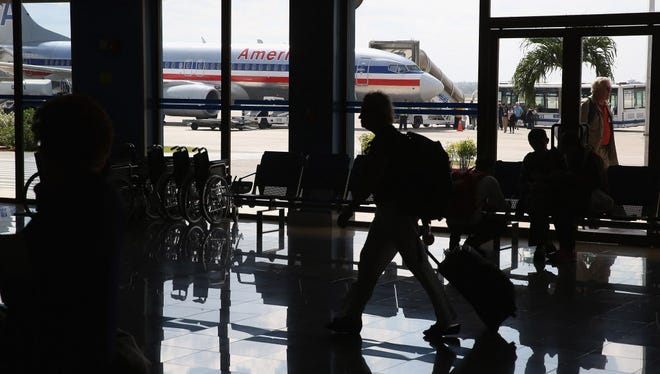U.S. airlines fight for rights to Cuba
WASHINGTON – The gloves are off as U.S. airlines describe why they deserve to fly the first scheduled flights to Cuba in more than 50 years.

Two airlines – American Airlines and JetBlue Airways – have proposed more daily flights to Havana than the 20 that the Transportation Department will award. While legacy carriers cite their reliability, low-cost airlines pitch their price.
In addition to the 12 passenger airlines, Federal Express would like to fly cargo to Havana five days per week. The delivery company contends that passenger planes won’t have enough room for supplies in their bellies to feed Cuba’s fledgling economy. Cell phones and computers are permitted for shipment to the Communist country, despite the trade embargo, according to FedEx.
Among the passenger airlines, FedEx "cannot discern any benefit their services would provide to U.S. shippers and U.S. commerce," Nancy Sparks, the company's managing director of regulatory affairs, said in her filing.
The U.S. and Cuban governments agreed that 20 daily flights to Havana and 10 each to nine other cities, as the countries restore diplomatic relations. Government officials hope to choose the winners this summer, with flights beginning as early as fall.
U.S.: Flights to Cuba expected to begin by fall
The competition is to serve Havana, where airlines proposed 51 daily flights and a variety of additional flights from one to five times per week.
Most of the daily flights — 38 — would be from Florida, which had two-thirds of the country’s 1.8 million people of Cuban descent in the 2010 Census. But that suggests travelers from elsewhere across the country will probably have to connect. The proposed daily flights from Florida include:
-- American: 10 from its Miami hub, along with one each from Charlotte, Dallas and Los Angeles.
-- JetBlue: eight from Fort Lauderdale, Orlando and Tampa, along with two from New York’s John F. Kennedy airport and one each from Newark and Boston.
-- Southwest Airlines: nine from Fort Lauderdale, Tampa and Orlando.
-- Delta Air Lines: two from Miami and one from Orlando, with one each from Atlanta and JFK.
-- Silver Airways: two from Fort Lauderdale and Palm Beach, with less-frequent flights from Fort Myers, Key West and Jacksonville.
-- Frontier: three from Miami and one from Denver.
-- Spirit Airlines: two from Fort Lauderdale.
-- Eastern Air Lines: one from Miami.
Nearly every big U.S. airline plans to apply for Cuba flights
American said 86% of the charter flights to Cuba originated from Miami last year, so their proposal mirrors that demand. Charters averaged at least 7.3 flights per day from Miami, which reflected a 14% increase from 2014, according to American.
“No airline is better prepared than American to maximize the benefits of scheduled service to Cuba,” according to Howard Kass, American’s vice president for regulatory affairs.
JetBlue, which said it typically cuts fares in half and doubles the number of customers traveling, argued it would be a better choice than American to expand in the Caribbean.
“To the detriment of travelers, American took advantage of its dominance to charge high airfares and offer inferior customer service,” Robert Land, JetBlue’s associate general counsel, said in a filing.
But other airlines sniped at American and JetBlue proposing a combined 25 daily flights, when only 20 are available.
Delta said it was confident government officials would recognize the “negative public interest” of allowing a single airline to hold too many slots. United said airlines seeking a disproportionate share of slots would serve south Florida “to the exclusion of the rest of the country.”
Major airlines lined up scores of supporters for their proposals. Despite the concentration in Florida, airport and elected officials in other cities made a pitch for their flights.
United Airlines proposed the fewest flights among the legacy carriers, with a daily flight from Newark and Saturday-only flights from Newark, Chicago O’Hare, Washington Dulles and Houston Bush airports.
But United submitted 15,000 letters from travelers, workers and vendors supporting the proposal, including from the city of Houston and the agency that oversees Dulles.
Deborah Flint, CEO of Los Angeles World Airports, supported the proposal from Alaska Airlines to offer two daily flights from her city with the fourth-largest Cuban population.
Ultra-low-cost carriers such as Frontier and Spirit said they would offer lower fares than larger rivals.
Among smaller airlines, Silver promoted its regional familiarity with 70 daily flights within Florida, and others to the Bahamas and around the Caribbean. Eastern cited its 90 charter flights each month within Cuba.
Sun Country Airlines proposed two flights per week from Minneapolis. And Dynamic International Airways proposed three flights weekly from JFK, four from O'Hare and four from Los Angeles.
But as government officials gauge which airlines will offer the most benefit, legacy carriers cited their reliability with completed flights and punctuality.
“The history of small, limited scope carriers trying to maximize the public benefits of limited entry markets or slot-constrained airports is poor and littered with failures like Vanguard, People Express and Air Florida,” Alexander Krulic, Delta’s associate general counsel, said in his filing.